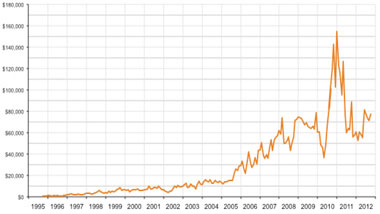|
If you are an American living overseas, the walls are closing in on you quickly. If your foreign bank hasn't already closed your account, don't hold your breath because it is probably coming quickly. A large number of excellent articles have covered the implementation of FATCA and reporting obligations of FBAR and Form 8938.
FATCA basically requires foreign financial institutions to report their American citizen account holders to the Feds beginning in 2014 or face the consequences of a 30 percent withholding tax on the financial institution's U.S.-sourced income. FBAR and Form 8938 (Statement of Specified Foreign Financial Assets) non-compliance carries penalties that will not only keep you up for more than a few nights but erase years of savings and investment. Lie about the existence of a foreign account on Schedule B of your Form 1040 and you may have committed tax fraud.
This article identifies a simple strategy to achieve tax-advantaged wealth accumulation while legally eliminating the U.S. reporting obligations outlined in the prior paragraph. One thing that this article is not telling you do is to commit tax fraud. If you owe back taxes pay them. The short-term pain is better than the long-term agony of regret sitting at the playground at the Big House.
Private Placement Insurance Products
Private placement insurance contracts are institutionally priced, customized variable universal life insurance and private placement variable deferred annuity contracts. At least one private placement life insurer has a private placement variable immediate annuity contract. The products are limited to accredited investors or qualified purchasers as defined under federal securities law. Basically, these are no load or very low load insurance contracts with super-charged investment flexibility.
These policies offer customized investment options for policyholders. The policies must be compliant under U.S. tax law for American citizens and resident aliens.
Tax Requirements for U.S. Insurance Contracts
Variable annuity contracts have a specific definition within the Internal Revenue Code, IRC Sec 72. Additionally, variable annuities also must also comply with the rules for variable insurance products found in IRC Sec 817(h) and Treasury Regulation 1.817-5.
Variable universal life insurance contracts must comply with the tax law definition of life insurance found in IRC Sec 7702 as well as the diversification requirements in IRC Sec 817(h) and Treasury Regulation 1.817-5.
As previously discussed both products are tax-advantaged. Variable annuities provide for tax-deferral on investment income. Depending upon whether the account value is annuitized, i.e. converted to a monthly payment for a term of years of lifetime income, a portion of each payment (exclusion ratio) is tax-free. Income that is not annuitized is normally fully taxable when distributed.
Life insurance receives very favorable tax-treatment. The investment income within the policy is not subject to current taxation. The policy is able to access the investment gains within the policy on a tax-free basis through partial surrenders of the cash value and very low cost policy loans. Ultimately, the death benefit will be income tax-free and possibly estate tax-free.
For the American taxpayer overseas, the majority of U.S. tax treaties have annuity provisions provide for no tax on annuity income in the Host Country and only in the Home Country when a distribution is taken.
One subtle difference between domestic and offshore policies is the ability to make premium payments in kind or non-cash. The assignment or transfer of an appreciated investment portfolio is treated as a sale or exchange for tax purposes and triggers a taxable gain (or loss).
FBAR, Form 8938 and Offshore Life insurance
The regulations for FBAR and Form 8938 treat an offshore life insurance policy as a foreign account for reporting purposes. Therefore, a transfer to an offshore life insurer in Bermuda or Cayman Islands does not fix the taxpayer's reporting obligation, i.e. TDF 90-22.1 and Form 8938. These rules apply to American policyholders regardless of whether or not the offshore life insurer makes an election under IRC Sec 953(d) to be treated as a U.S. taxpayer.
The regulations are very clear that accounts in certain U.S. commonwealths such as Puerto Rico, Guam, American Samoa, U.S. Virgin Islands and the North Marianna Islands are not subject to these reporting requirements.
Isla Del Encanto - Boricua Life
The commonwealth of Puerto Rico (PR) has its own tax code. Largely, the tax code in the PR follows the Internal Revenue Code almost verbatim. The Commonwealth Government has always been very clever and had great foresight in stimulating the local economy by offering strong tax incentives for corporations operating in Puerto Rico.
In the last year or so, Puerto Rico has updated its insurance legislation to encourage the formation of insurance companies operating internationally in Puerto Rico. In effect, Puerto Rico has become on "onshore -offshore" jurisdiction for insurance. Puerto Rico also has strong separate account legislation which segregates the assets in a variable life insurance or annuity contract from the claims of the insurer's creditors. Several life insurers issue private placement U.S. tax compliant life insurance and annuity contracts. These companies absorb very little risk.
Virtually all of the mortality risk is shifted to investment grade reinsurers. Additionally, the separate account or investment assets of the policy are custodied with large independent financial institutions.
It may be technically possible to retain the foreign financial institution as the custodian for the policy separate account. The foreign financial institution may take exception to this treatment if the account has any U.S.-source income. Additionally, the foreign financial institution may determine that the account is effectively an American account.
From a "going concern" point of view, the PR life insurers are established as operating companies meaning they have reached a threshold level of business to remain in business. As a result, it does not really matter that the company does not have the same financial ratings as Northwestern Mutual or MassMutual.
Policies issued to an American citizen or resident alien are not subject to reporting obligations of FBAR and Form 8938. Generally, the Puerto Rican life insurer will allow the American to take an insurance exam in the states. The taxpayer may need to create a single member Puerto Rican LLC to serve as the applicant, owner, and beneficiary of the policy in order to avoid the PR carried from being considered as "doing business as a non-admitted carrier" in the taxpayer's state of residence. Summary
The implementation of FATCA, the expansion for tax information exchange treaties and reporting obligations under FBAR and Form 8938, suggest that the tax holiday is over for Americans. If the level of fines and penalties are not enough to make you flinch, then you sir (or Madam) have a spine and nerves of steel.
If you have just gotten kicked out of your foreign mutual fund or bank (or about to be!), the recommendation outlined above might be an interesting solution for you. The ability to transfer your cash or investment portfolio into a structure that is compliant for U.S. tax and tax reporting purposes while achieving tax-advantaged accumulation is a powerful solution to the problem.
Authors Note: The above article was written by Gerry Nowotny, a tax and estate planning attorney with a JD and LL.M in estate planning from the University of Miami School of Law. | 





















 Home Page
Home Page